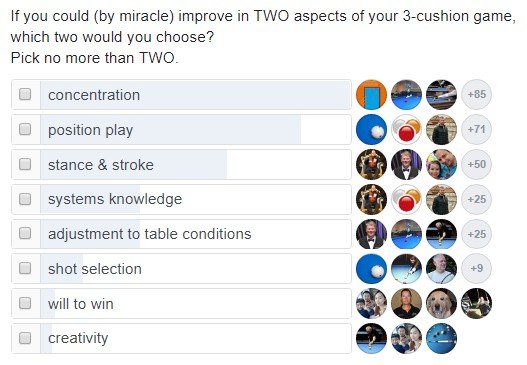In my little hobby-corner on Facebook, I did a survey the other day. The idea was, to let people tell me where they failed, which aspects of their 3-cushion game they considered to be the weakest. My original question did not sound all that elegant, so I came up with this, more diplomatic version:
"If you could, by miracle, improve in TWO aspects of your 3-cushion game, which two would you choose?"
The respondents average anything from 0.300 to 1.250, but my guess is more than 80 % are between 0.500 and 0.850 and over 40 years of age. That means most of them are not World Cup players, but they have relevant experience and a fair bit of knowledge. In the world of Jaspers and Caudron, 0.700 may not sound super impressive, but if you get there, you have vastly more players below you on the ladder than above you.
As you can see in the picture, there were eight options, and people were asked to check two boxes at most. A couple of hundred answers came in, and I think those answers paint a fairly good picture of HOW WE SEE our own game. That leaves another question wide open: Do we see our own game for what it is, or do we close an eye for things we are not too happy with? I was more than a little bit surprised by some of these results, and the reason can obviously be found in the answer to the second question.
Let's first take a look at the answers, in ascending order:

3 votes: creativity. This aspect of the game is the lowest on the list, which implies it does not bother us at all. If we have trouble improving our average, it's not because we lack creativity. Or do we?
4 votes: will to win. Again, not a problem. We consider ourselves to be warriors, we are ready to die on that hill. Willpower is not our weak point.
12 votes: shot selection. A total shocker, as far as I'm concerned. This is the answer that I expected to top the list. Why? Because improving your shot selection is the quickest, most efficient way of getting to a higher average. But of course, you can understand why people are not enthusiastic to say: "I could be a decent player if I didn't pick the wrong shot so often."
28 votes: adjustment to table conditions. Another one that should have been higher up. If you lack the flexibility and the billiard brain to adjust to a table, your game is not just going to drop 10 % in quality. It's going to fall apart. There is a direct relation to the next entry:
28 votes: systems knowledge. You can study systems all day and all night, but if you can't make compensations for table conditions, all your bank shots are going to be close misses. This aspect is the one with the lowest ROI (return on investment) on the list.
53 votes: stance & stroke. Third on the list, many people feel they should improve in this aspect. The good news: you are halfway there if you have a friend with a smartphone. Record 10 - 15 minutes of your (match) play and watch it. It will make you humble, and hungry for improvement. The bad news: getting rid of bad habits can be a tough task, certainly if you've been making the same physical mistakes for twenty years.
74 votes: position play. Good answer, but (like systems knowledge) it does depend a lot on the playing strength you already have. If your season average is around 0.400, you should be concentrating on your technique, and on getting familiar with the lines. Position play will become a crucial part of your game later on.
88 votes, the winner: concentration. This is what we are most critical about, in ourselves. Or is it just the weakness we feel it is easiest to admit to? "I could play a much higher season average if I had better focus." That sounds cooler than: "I am fairly talented, but mentally so weak. I just don't have the will to win."
A last word about that all-important category: shot selection. Every shot you play, made or missed, goes into your memory bank. It's like your internal hard-drive. Weeks or months later, you'll have a similar position and your brain will start to scan your memory, to help with the decision making. How much ball to hit, with how much english, and at which speed. If you pick the wrong solution rather often, you can still make progress, by getting it closer or making it slightly more often. But it's a slow process, there will be a low ROI.
Getting better at the right shot, that's AS MUCH work, but the rewards are exponentially larger. Look at it like this: you have two savings accounts, one with 100 euro in it, and one with a 1000. Getting 5 % interest instead of 1 % on the first account is nice, but you'd be better off if you got 2 % instead of 1 % on the second account! Those shots the pros play, that you wouldn't dare to take on? They don't play it like that because it's HARDER, do they? They have a keen eye for the success rate of a solution, and sometimes things that look dazzling when played by a pro are actually EASIER than what you tried.
Talk to a better player, ask them to watch half an hour of your match, and later point out three or four shots that you butchered. It will be a bit painful maybe, but worth it. Praise will get you nowhere.
